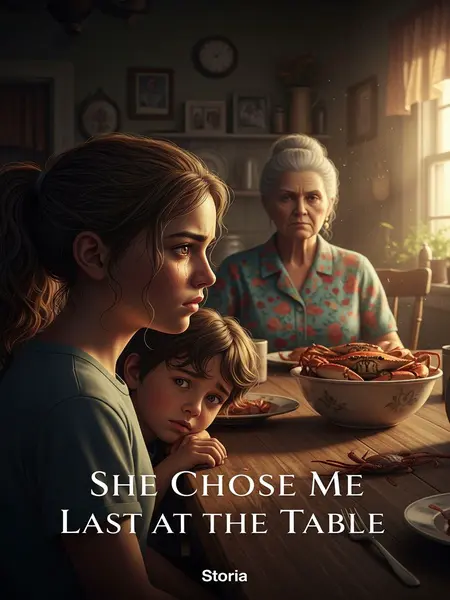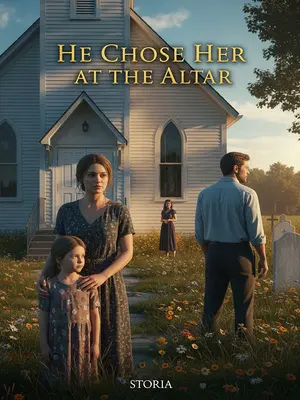Chapter 1: The Missing Crabs and Grandma’s Rules
There are five people in my family. Dad brought home a dozen Maryland blue crabs. But by the time they were steamed and set on the table, only four were left.
The kitchen was thick with Old Bay and laughter—the kind that floats up on a Friday night after a long week. When the crabs hit the table, it was like the starting gun at a race. You’d think we were starving. Everyone dove in at once, but somehow, only four crabs made it to the platter. In our house, food disappears faster than you can blink—especially with Dad around.
Of course, Grandma reached over with her fork and scooped one onto her plate, leaving mine empty as a joke.
Her mouth twitched in a half-smile. The kind that said she was up to no good. Grandma always had a mischievous streak, keeping us on our toes. "Guess you gotta be quicker, Addie," she teased, nudging the crab to the center of her plate like it was her trophy.
Mom breezed in, still in her work heels. Dropped her purse by the door, and without missing a beat, plucked the crab right off Grandma's plate. She handed it to me with a conspiratorial grin, like we were partners in crime. "Don’t let her get away with it, honey," she whispered, loud enough for Grandma to hear.
Mom shot Grandma a look and said, "Mom, you really think you deserve the crab meat at your age? Here, have a claw to gnaw on."
She tossed a crab claw onto Grandma’s plate. Smirked. “Claw’s got all the flavor anyway.” Grandma snorted, but she was smiling too. This was their way of sparring—half affection, half competition, and always entertaining.
I look like Mom—same stubborn chin, same hair—but I’m soft like Grandpa.
My hair falls just like hers. We share the same stubborn chin. But where she’s all fire and quick comebacks, I’m quiet and gentle, more likely to watch from the sidelines than jump into the fray. Grandpa used to say I had a heart like warm bread—soft in the middle, always ready to soak up someone else’s troubles.
Whenever I came home crying after getting picked on, Mom would sigh and say, "How’d I end up with a daughter who got Grandpa’s soft side instead of mine?"
She’d shake her head, pretending to be exasperated. Then she’d ruffle my hair, muttering, "Should've known you'd turn out like Dad's side—soft as mashed potatoes."
"Addie, don’t be scared. Here’s what you do: If a boy messes with you—knee him. Right in the family jewels. If a girl bullies you, punch her right in the chest. Works every time."
She’d crouch down, dropping her voice like she was sharing a secret. "Seriously, Addie, you gotta stand your ground. Don’t let anyone walk all over you."
She’d squat down in front of me. Patiently, she’d show me how to fight back—quick, sharp, right on target.
Sometimes she’d get so animated, Dad would peek around the corner, eyebrows raised. He’d just shake his head.
Dad, off to the side, would awkwardly cross his legs and find an excuse to step out on the porch for a smoke.
He’d fumble for his lighter, mumbling something about checking the weather, and disappear outside. Everyone knew he was just dodging Mom’s combat lessons.
I’d look at Mom, confused. How could she fit eight curse words in one sentence, with a face like that?
It was kind of magic, honestly. She’d let loose a string of words I wasn’t allowed to repeat, all while her lipstick stayed perfect. I’d stare at her, half in awe, half scandalized, wondering if all grown-ups were like this when no one was watching.
One night, I caught them in the living room, giggling over some story about a plumber and a nun. Sloshing cheap merlot into each other’s glasses. It hit me then—being tough and having a wicked sense of humor was their love language, passed down like a family recipe.
She’d say, half-joking, half-serious, that one day she’d have to find me a six-foot-three farm boy from Iowa. Dad would just shake his head, muttering, "As long as he can cook."
Luckily, my little brother, born later, made up for that. He’s not even eight and already pushing four-eight—definitely a future linebacker.
Mason was the kind of kid who looked like he could bench-press a cow by third grade. His sneakers were always muddy. His hands, sticky. His laugh shook the walls. If anyone was going to scare off the bullies, it was him.
But my brother is a handful. Mom and Dad are always busy with work or on business trips, so they don’t have much time to rein him in. Since I’m too soft, he’s not scared of me either.
He’d run wild through the house, leaving a trail of Legos and empty juice boxes. When I tried to lay down the law, he’d just grin and dare me to stop him. He knew I never would.
That’s when Grandma from the old family farm piped up. She said she had time to look after us, so she decided to move in.
She called from her landline, voice crackling with static and authority, declaring she was coming to whip us into shape. Dad hung up, looking like he’d just been drafted into the Army.
They figured having Grandma around would keep us connected to our roots, and maybe give them some peace of mind while they juggled work. The idea sounded good—on paper, anyway.
She arrived with a battered suitcase, wearing her Sunday best even though it was Tuesday. And immediately started rearranging the furniture like she owned the place. The smell of mothballs and menthol cough drops followed her everywhere.
We’d only ever visited her farm for holidays. She’d make us shuck corn and chase chickens. Her hugs were stiff, her stories long, and she never missed a chance to remind us how easy we had it.
Dad would sit us down after dinner and tell stories about her hauling water before dawn and walking uphill both ways to school. He’d say, “Your grandma’s tougher than a two-dollar steak, but she means well.”
I imagined late-night stories, maybe baking pies together. Learning about the old country.













